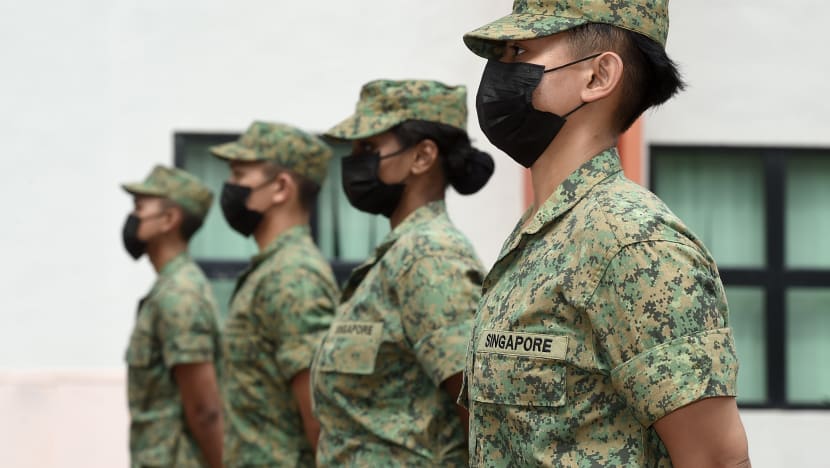All NSFs to get extra S$1,000 in cash after ORD, NSmen to get monthly base pay of S$1,600 regardless of employment

Singapore Armed Forces soldiers. (Photo: SAF)

Aqil Haziq Mahmud
03 Mar 2022 12:15PM (Updated: 03 Mar 2022 12:18PM)
BookmarkShare
SINGAPORE: From Apr 1, all full-time national servicemen (NSFs) will get an additional S$1,000 in cash after their operationally ready date (ORD) – the first milestone on their NS journey.
They will get S$500 after the second milestone of completing three high-key in-camp training (ICT), and another S$500 after the third milestone of completing the full operationally ready national service (ORNS) training cycle.
"The NS HOME cash payment is intended to better recognise our national servicemen’s contributions to national defence," the Ministry of Defence (MINDEF) said in a factsheet on Thursday (Mar 3).
Currently, non-commanders already get a S$3,000 top-up in their Post-Secondary Education Account or CPF Ordinary Account, as well as a S$2,000 top-up in their CPF Medisave Account after completing each milestone.
"Our national servicemen will now receive at least S$6,000 at the end of their full-time national service, and at least S$5,500 at the mid-point and at the completion of their ORNS journey," Senior Minister of State for Defence Heng Chee How said in his ministry's Comittee of Supply debate on Thursday.
The change will benefit 54,000 SAF and Home Team servicemen every year, he said.
The additional cash payouts will be disbursed through the LifeSG mobile application and provides servicemen with the flexibility to use the award to meet immediate needs, MINDEF said.
The cash credits can be used at a "wide range of physical and online merchants", including at any of the 164,000 merchants that accept PayNow.
Related:

SAF to review PES medical classification system, paving the way for servicemen to be deployed in more roles

All NSFs, NSmen to get higher monthly NS allowance in recognition of contributions
This initiative was developed by the NS Review Committee, established in 2020 to improve the NS experience. The committee will conclude this year.Also as part of the initiatives, SAF operationally ready national servicemen (NSmen) will get a monthly base pay of S$1,600 for reservist activities, regardless of their employment status.
This amount will be pro-rated for the duration of the reservist activity.
“This will be especially useful for those in informal employment and training,” Defence Minister Ng Eng Hen told Parliament on Wednesday.
The total make-up pay will also be automatically computed using income and employment data from the Inland Revenue Authority of Singapore (IRAS) and CPF Board.
More than 100,000 NSmen and 25,000 employers will benefit from the automated make-up pay and base NS pay, Dr Ng said.
Some NSmen, mostly the lower-income, might be getting income from informal jobs, gig employment or other payments such as training allowances and incentives that are not captured in databases of CPF Board and IRAS, Mr Heng said.
"NSmen and employers will be provided the opportunity to review the computed amounts. If no objections are raised, the amount will be paid out to them automatically," Mr Heng said.
"Those who believe that the computed amounts are not up-to-date, they can certainly submit additional information for recalculation."
Mr Heng also announced that come 2023, MINDEF and the Ministry of Home Affairs will increase the Group Term Life and Group Personal Accident core insurance coverage for all NSmen to S$300,000 each.
"This will help ensure that the financial support and protection we accord our national servicemen remain relevant and adequate," he said.
Since 2016, MINDEF and MHA have been purchasing these policies for their servicemen for a sum assured of S$150,000 each.
MINDEF will also launch a OneNS platform to replace the NS Portal and consolidate all NS-related digital services and transactions.
"The idea is to centralise these transactions and essential NS services onto the OneNS platform, and render it more accessible via a single mobile application or a revamped web portal," Mr Heng said.
"For a start, NSmen can look forward to enhanced call-up and deferment –services, to facilitate preparation for ICT. Other e-services will be rolled out subsequently and progressively."
This comes after the ministry announced in 2019 that it will consolidate all NS-related physical services – from the pre-enlistment medical to the individual physical proficiency test – at a new NS Hub, to be completed in 2023.
FUNCTIONAL ASSESSMENTS AT PRE-ENLISTMENT
On the deployment of NSFs, MINDEF said functional assessments will be implemented at pre-enlistment medical screening from this year."Functional assessments replicate the physical demands required for daily operations, enabling the SAF to better match servicemen’s functional abilities to the role’s actual demands," it said.
"Pre-enlistees with selected orthopaedic conditions and sports injuries will undergo tests to assess their functional capacity related to range of motion, stability and strength," MINDEF said.
"The pre-enlistees’ functions will be examined by trained physiotherapists in the SAF and assessed against the physical demands of the job-specific training requirements."
The functional assessments were developed in consultation with external specialists in the field of physiotherapy, alongside SAF physiotherapists from the Centre of Excellence for Soldier Performance.
In 2019, the SAF said it will review the use of the medical classification system and physical employment standards (PES) system so it can better deploy servicemen in more roles according to their abilities.
MINDEF said then that the SAF will explore the use of functional assessments to determine servicemen’s deployability in specific vocations, such as for the selection of transport operators – a combat service support vocation.
In 2021, the SAF redesigned 1,000 jobs; another 800 jobs will be redesigned by 2023, MINDEF added.
"Take for example the redesign of the medic role," Mr Heng said. "Leveraging advances in medical technology and efforts to define the physical demands required for each specific role, servicemen of varying physical capabilities can now be deployed as medics."
Moving on to NSmen, MINDEF said it will from this year allow eligible NSmen with relevant expertise to be redeployed at any point in their ORNS cycle, instead of only after they have served a minimum of two high-key ICTs and five ORNS years.
Eligible NSmen can now also be redeployed across all levels, including into roles assumed by warrant officers, specialists and enlistees, and not just into officer roles.
"This will allow MINDEF/SAF to better optimise and maximise expertise that NSmen may have picked up in their civilian lives, and allow the SAF to better meet its operational needs," MINDEF said, adding that such redeployments will be subject to the SAF’s operational needs.
Servicemen are encouraged to update information pertaining to their education qualifications and work experience on the NS Portal, so as to benefit from these changes.
DIGITALISING SAFETY SYSTEMS
On safety, MINDEF said it will establish the Heat Resilience and Performance Centre to address rising ambient heat, which poses a critical risk to operational readiness.The centre, which will be set up in the National University of Singapore in the middle of this year, will study heat mitigation strategies and develop more fundamental approaches to prevent heat injury in the SAF, Mr Heng said.
"We recognise that rising ambient temperatures due to climate change will increasingly impact the well-being of our servicemen and effectiveness of our training and operations," he added.
This comes as MINDEF and the SAF have been using technologies such as artificial intelligence and data analytics as well as researching novel technologies to improve existing frameworks that ensure safety during training and operations.
In 2018, NSF Dave Lee died nearly two weeks after displaying signs of heat injury following a fast march at Bedok Camp.
An external review panel that year found that the SAF’s heat injury measures were “generally sound and aligned with prevalent industry and foreign military practices”, noting that the total number of heat injuries in the army declined from 27 in 2012/2013 to 20 in 2017/2018.
MINDEF also said on Thursday that it has launched an enterprise safety information system that improves commanders’ safety situation awareness and safety prevention efforts. The system could also predict future safety breaches using data analytics.
In 2020, the SAF Inspector-General's Office (IGO) found areas for improvement in communication about safety down the command chain. It is currently in its second year of auditing the SAF.
"Compared to the first audit cycle, commanders and servicemen were observed to have taken even more ownership in upholding safety practices and displayed more awareness towards potential safety hazards," Mr Heng said of the IGO's two-year audit cycle.
"Going forward, the SAF will continue to sustain our emphasis on safety policies and processes, and to ensure that safety lessons will be passed on even as we see the turnover of servicemen."

